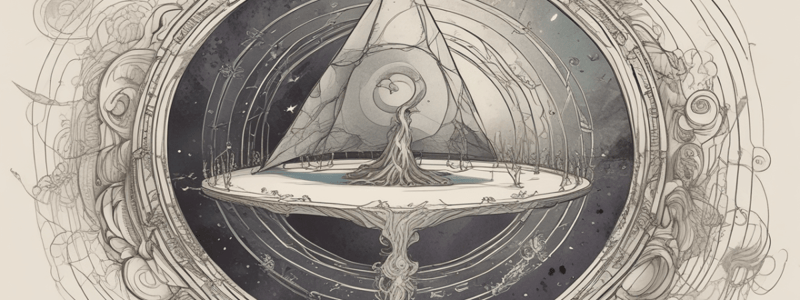Podcast
Questions and Answers
What is the primary issue with multiple realizability?
What is the primary issue with multiple realizability?
- It assumes that the existence of one entity implies the existence of another (correct)
- It cannot be resolved through transcendental arguments
- It fails to account for the complexity of causality in the phenomenal realm
- It ignores the role of sensibility in shaping our understanding of reality
What is the primary function of the faculty of understanding according to Kant?
What is the primary function of the faculty of understanding according to Kant?
- To provide sensory data
- To unify sensory data through concepts (correct)
- To construct a web of knowledge
- To describe the world in itself
What is the main characteristic of synthetic a priori judgments?
What is the main characteristic of synthetic a priori judgments?
- They are based on empirical evidence
- They combine empirical and rational elements (correct)
- They are based on innate concepts
- They are derived from reason alone
What is the primary goal of transcendental arguments?
What is the primary goal of transcendental arguments?
What is the main distinction between the world in itself and the phenomenal realm?
What is the main distinction between the world in itself and the phenomenal realm?
What is the purpose of regulative ideas in Kant's philosophy?
What is the purpose of regulative ideas in Kant's philosophy?
What is the primary consequence of recognizing the limitations of reason in the antinomies?
What is the primary consequence of recognizing the limitations of reason in the antinomies?
What is the main implication of Kant's transcendental idealism?
What is the main implication of Kant's transcendental idealism?
Study Notes
Things in Themselves
- Refers to objects beyond the constraints of human cognition
- Mind-independent, existing regardless of human perception
- Existence is inferred through the best explanation, despite limited interaction with the phenomenal realm
Phenomenal Realm
- Realm of appearances, shaped by human perception
- Mind-dependent, exists only in relation to human cognition
Transcendental Arguments
- Argument that identifies necessary conditions for something to be possible
- Grants that something exists and asks what conditions make it possible
- Example: If self-conscious experience is possible among finite beings, it must have sensibility, understanding, and reason
Synthetic A Priori Judgments
- Judgments that combine empirical and rational knowledge
- Examples:
- Every event has a cause
- Every event occurs in space and time
- Properties inhere in substances
- All objects relate to each other in space and time
Transcendental Idealism
- Faculties of cognition:
- Sensibility: sensory data
- Understanding: concepts that unify sensory data
- Reason: constructed like a web of knowledge, positions things in a totality
The Antinomies
- Arguments that seem contradictory, but can be resolved by recognizing that reason is not describing the world in itself
- Examples:
- Free will and agency
Regulative Ideas
- Structures our inquiries, guiding our understanding of the world
- Examples:
- Don't speculate about the world beyond appearances
- Every event has a cause
Theories of Truth
- Coherence Theory: things are true if they are part of a coherent truth
- Example: Theory of Evolution
- Correspondence Theory: claims are true if they correspond to the way the world is
Studying That Suits You
Use AI to generate personalized quizzes and flashcards to suit your learning preferences.
Description
Explore the concepts of things in themselves, beyond cognitive constraints, and the phenomenal realm in Kant's philosophical framework. Discover how inference to the best explanation helps understand their existence.




